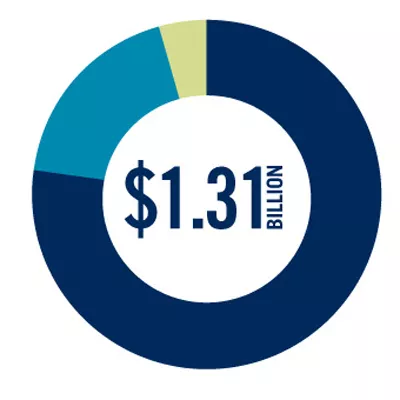
U of T Mississauga injects $1.3 billion into Peel region, provincial economy, report shows
U of T Mississauga contributes more than $1.3 billion annually to the economy of the Region of Peel and Province of Ontario, says the campus’ recently released Economic Impact Report.
This independent report, compiled by KPMG LLP, notes U of T Mississauga’s annual economic impact comprises a total of $317.4 million in ongoing spending through the production of goods and services and through capital spending, and nearly $1 billion in additional income earned by alumni living in the Greater Toronto Area. Ongoing spending includes $272.7 million in spending by U of T Mississauga, its students, faculty, staff and visitors, and $44.7 million in capital spending.
The annual economic impact also includes the creation of an estimated 2,930 full-time jobs in Ontario, generated directly and indirectly: 2,450 jobs created by spending by U of T Mississauga, its students, faculty, staff and visitors, and 480 jobs created by capital spending.
The capital spending and capital job creation will continue over the next five years. The campus continues its “growth and investment in infrastructure,” the report notes, building from its roots as a one-building school to a campus with 26 buildings, a diverse student population, dedicated faculty and staff, a wide range of academic offerings and a supportive alumni network.
“This report unequivocally shows the critical role that U of T Mississauga plays in shaping the economic future of Mississauga and Peel region,” says Professor Deep Saini, vice-president of the University of Toronto and principal of U of T Mississauga. “Through our investment in attracting outstanding faculty members and bright, motivated students, we are driving innovation, advancing productivity and helping to build a knowledge-based economy. And by continuing to cultivate important relationships with our municipal and regional partners, industry and the broader community, we’re boosting economic growth and quality of life for our city, region and province.”
Other notable findings in the economic impact report include:
• U of T Mississauga generates about $9.1 million in research revenues per year, representing 478 active research projects annually
• Faculty have received more than 30 national and international awards and honours since 2009
• In 2012-13, students dedicated about 45,000 hours of volunteer service, valued at $1.1 million, to enriching programs for at-risk populations, improving protection of the environment and raising awareness about issues of social justice
• In 2012, approximately 18 per cent of new undergraduate intakes were international students
• Nearly 2,000 people, including immigrants and newcomers, enroll in courses offered through the School of Continuing Studies at U of T Mississauga to upgrade skills and accreditations
• The Mississauga Academy of Medicine, scheduled to reach an enrolment of 216 students by 2015, helps to address an urgent need for more physicians, including family doctors, in Peel region
• Tens of thousands of community members visit U of T Mississauga annually to improve their health, participate in professional and recreational activities, and attend events
• U of T Mississauga’s new Institute for Management and Innovation will help drive innovation through human talent and research, address perceived workforce gaps and fulfill the needs of key sectors in the city
“The University of Toronto Mississauga is a vital contributor to the prosperity of Mississauga and the Region of Peel,” said Sheldon Leiba, president and CEO of the Mississauga Board of Trade. “Its skilled workforce, talented graduates and students along with its culture of innovation inspire and drive our economic growth and social progress.”
The Economic Impact Report examined U of T Mississauga’s value to its municipal, regional and provincial jurisdictions through a quantitative analysis of operating and capital expenditures, and non-local student and visitor expenditures.
The KPMG team also conducted interviews with internal and external stakeholders and examined additional data from U of T Mississauga for a qualitative analysis of the campus’ social and economic impacts on its community.
U of T Mississauga, established in 1967, has about 12,800 students and 800 faculty and staff. Its 26 buildings sit on 225 acres of land along the Credit River in Mississauga.
CONTACT:
Jane Stirling
Marketing and Communications
U of T Mississauga
905-569-4350
jane.stirling@utoronto.ca
Nicolle Wahl
Marketing and Communications
U of T Mississauga
905-569-4656
nicolle.wahl@utoronto.ca
